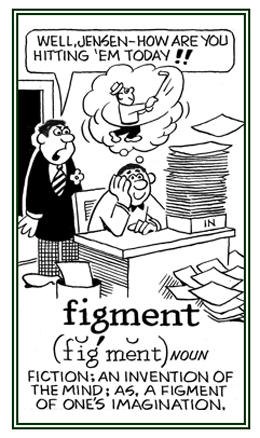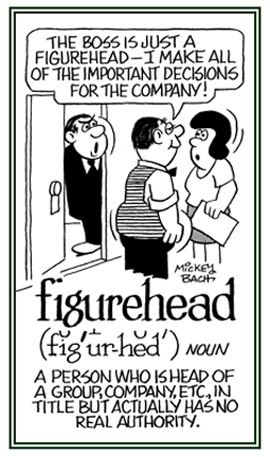figur-; fig-
(Latin: form, shape, figure; to make, to shape, to form)
1. Something produced by, or only existing in, someone's imagination: Was it only a figment of his dream that Harry's girlfriend had agreed to marry him, or was it really true?
2. Something invented, made up, or fabricated: It was just a figment of her imagination without any basis on fact that Mary will get to go on a trip with her friends in the summer.
3. An invention; a fiction; something imagined: The assertions that the new governor will improve the financial growth for his state are the figments of idle political brains.
4. Etymology: from Latin figmentum, "something formed or fashioned, creation"; related to figura, "shape"; from Old French figure; from Latin figura, "a shape, a form, a figure".

© ALL rights are reserved.

© ALL rights are reserved.
Go to this Word A Day Revisited Index
2. Something invented, made up, or fabricated: It was just a figment of her imagination without any basis on fact that Mary will get to go on a trip with her friends in the summer.
3. An invention; a fiction; something imagined: The assertions that the new governor will improve the financial growth for his state are the figments of idle political brains.
4. Etymology: from Latin figmentum, "something formed or fashioned, creation"; related to figura, "shape"; from Old French figure; from Latin figura, "a shape, a form, a figure".


Go to this Word A Day Revisited Index
so you can see more of Mickey Bach's cartoons.
figmentary
Something imagined or created by a person in his or her mind.
figurant
1. A member of a corps de ballet who does not perform solos.
2. A stage performer having no speaking part.
2. A stage performer having no speaking part.
Someone who dances at an opera, not singly, but in groups or figures.
An accessory character on the stage, who is in its scenes, but has nothing to say; therefore, someone who figures in a scene, without taking a prominent part in it.
figurate
Having a definite or particular shape or figure.
figuration
1. A depiction of something in emblematic or allegorical form or the act of forming something into a particular shape.
2. The use of musical figures or other ornaments to embellish or to vary a theme.
3. The process of giving allegorical or emblematic form to something abstract; especially, by representing it by using human or animal figures.
2. The use of musical figures or other ornaments to embellish or to vary a theme.
3. The process of giving allegorical or emblematic form to something abstract; especially, by representing it by using human or animal figures.
figurative
1. Using or containing a nonliteral sense of a word or words by making use of figures of speech.
2. Relating to or representing a form in art by means of human or animal figures.
3. Represented by a figure or resemblance; symbolic or emblematic.
2. Relating to or representing a form in art by means of human or animal figures.
3. Represented by a figure or resemblance; symbolic or emblematic.
figuratively
1. A reference to being represented by means of an emblem, a likeness, a figure, etc.
2. In a painting, a sculpture, etc., relating to, or characterized by the naturalistic representation of the external world.
2. In a painting, a sculpture, etc., relating to, or characterized by the naturalistic representation of the external world.
figure
1. A written or printed symbol representing something other than a letter of the alphabet; especially, a number.
2. An amount represented in numbers.
3. A person, especially a well-known one; such as, a person's public image or presence.
4. The shape of an individual human body; especially, with regard to its slimness or attractiveness.
2. An amount represented in numbers.
3. A person, especially a well-known one; such as, a person's public image or presence.
4. The shape of an individual human body; especially, with regard to its slimness or attractiveness.
1. The carving, sculpture, or statue of a person positioned at the prow of a vintage sailing ship: When Mrs. Jackson’s class visited the museum, the students were able to see an old-fashioned clipper with a figurehead of a woman at the front of it.
2. A formal leader without any control or authority: The ceremonial king or queen is a figurehead of a country and he or she can represent it, while others have the power to make actual governmental decisions.

© ALL rights are reserved.
Go to this Word A Day Revisited Index
2. A formal leader without any control or authority: The ceremonial king or queen is a figurehead of a country and he or she can represent it, while others have the power to make actual governmental decisions.

Go to this Word A Day Revisited Index
so you can see more of Mickey Bach's cartoons.
figurine
1. A small molded or sculptured figure; a statuette.
2. A small ornamental figure, often composed of ceramic or metal.
2. A small ornamental figure, often composed of ceramic or metal.
The shape of a human body that looks like a sand timer: Jill had an hourglass figure of a lady that was very narrow at her waist and quite wide at her hips and bust.
prefiguration
1. A representation, often in a form or likeness, of a person, thing, or event that is to come; a foreshadowing.
2. The act of representing, suggesting, or imagining in advance.
2. The act of representing, suggesting, or imagining in advance.
prefigure
1. To have qualities that represent or which suggest something that is going to happen or exist later.
2. To think about or to imagine a person, thing, or event in advance.
3. To represent, often in form or likeness, a person, thing, or event that is to come.
2. To think about or to imagine a person, thing, or event in advance.
3. To represent, often in form or likeness, a person, thing, or event that is to come.
transfiguration
1. A striking change in the appearance or character or of circumstances.
2. A significant change in the form or the appearance of someone or something; a metamorphosis.
2. A significant change in the form or the appearance of someone or something; a metamorphosis.
transfigure
1. To alter the outward appearance of someone or something.
2. To transform the appearance of someone or something, revealing great beauty, spirituality, or magnificence.
2. To transform the appearance of someone or something, revealing great beauty, spirituality, or magnificence.
Inter-related cross references, directly or indirectly, involving word units dealing with "form, shape, appearance": eido-; form-; icono-; ideo-; imag-; morpho-; -oid; typo-.
Showing page 2 out of 2 pages of 30 main-word entries or main-word-entry groups.

